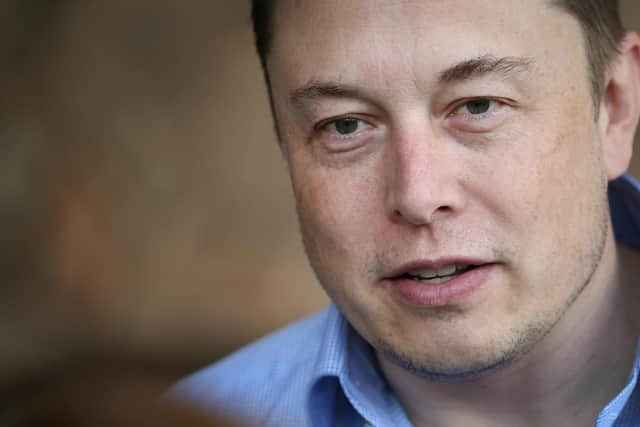What is Bitcoin mining? How to mine leading cryptocurrency and mining rig process explained
This article contains affiliate links. We may earn a small commission on items purchased through this article, but that does not affect our editorial judgement.
and live on Freeview channel 276
Bitcoin has made steps to improve its sustainability after the creation of a dedicated mining council for the cryptocurrency.
The council will encourage miners to use renewable sources of energy as well as promote transparency in its usage, amid widespread criticism of the process.
Advertisement
Hide AdAdvertisement
Hide AdFormation of the council comes after a meeting with Bitcoin miners and Elon Musk who recently announced Tesla would no longer accept the crypto as payment for its products.


Musk, CEO of the electric car company, confirmed the decision on Twitter, citing the environmental impact of Bitcoin’s mining and transactions processes.
The announcement had a huge impact on Bitcoin’s share price, which immediately plummeted 11%, and the market value of other cryptocurrencies.
It comes just weeks after Musk, an advocate for cryptocurrencies and a fan of Dogecoin, revealed Tesla had invested heavily in Bitcoin and would accept it as payment.
Here’s a beginners guide to Bitcoin mining.
What is Bitcoin mining?
Advertisement
Hide AdAdvertisement
Hide AdBitcoin mining is a way for new digital tokens of the cryptocurrency to be entered into circulation.
Users can mine new Bitcoins - essentially minting currency - by monitoring and auditing the cryptocurrency’s network and ensuring transactions made are clean and legal.
Mining is needed to maintain the Bitcoin ecosystem as there are no authorities such as central banks or governments to regulate, meaning it is a decentralized exchange.
In return, miners can earn Bitcoin tokens for completing blocks of verified transactions, which are then added to the register called a blockchain, without having to put their own money in.
Advertisement
Hide AdAdvertisement
Hide AdYet users have to complete a complex puzzle before reaping the rewards of their hard work auditing transactions - and there is a cap to how much Bitcoin mining can be done.
Bitcoin tokens are capped at 21 million, as per the cryptocurrency’s own protocol, with current data estimating that around 18.5 million Bitcoins are in circulation.
Projections see the last Bitcoin token being entered into circulation around the year of 2140.
How does Bitcoin mining work and what are mining rigs?
In order to mine Bitcoin, users need high specification technology systems - including a graphics processing unit of some kind - and know how to use them.
Advertisement
Hide AdAdvertisement
Hide AdOnce you have a mining rig set up and the knowledge then the task of auditing transactions can begin to prevent fraudulent behaviour such as double spending the same token.
Miners are tasked with ensuring that there is one version of one token in the Bitcoin ecosystem.
Because Bitcoin is a digital currency, there is the possibility users might make multiple copies of the same token to make more transactions than they can legitimately make.
With physical currency, once a payment is made the person making the payment is no longer in possession of the coin or note used to make the purchase - and it’s the same for digital tokens.
Advertisement
Hide AdAdvertisement
Hide AdBitcoin mining is to ensure there is one version of each digital token in circulation at any time.
Once a Bitcoin miner has verified 1 MB (megabyte) of Bitcoin transactions, known as a block, then they are eligible to be rewarded with Bitcoin tokens - though there is no guarantee.
The miner then has to be the first to correctly answer a numeric problem, known as proof of work, which can be arduous work and also takes up a lot of computing power.
Is Bitcoin mining bad for the environment?
Due to the volume of electricity needed to mine and successfully solve the numeric problem, concerns have been raised over the impact Bitcoin mining has on the environment.
Advertisement
Hide AdAdvertisement
Hide AdBitcoin mining is said to swallow up huge amounts of energy per year.
Research by the University of Cambridge and the International Energy Agency found that current levels of Bitcoin mining were on a par with the entire energy consumed by the Netherlands in 2019.
The same study revealed that 70% of Bitcoin production came from China where renewable energy was used during the rainy summer months but fossil fuels, such as coal, were used for the rest of the year.
Some Bitcoin backers are keen to point to the carbon footprint of the existing financial system which employs millions of people to work on computers in air-conditioned offices.
What has Elon Musk said about Bitcoin mining?
Advertisement
Hide AdAdvertisement
Hide AdElon Musk confirmed Tesla would suspend the use of Bitcoin as payment for its vehicles, weeks after introducing the initiative to accept the cryptocurrency.
In a Twitter post, the billionaire entrepreneur said: “We are concerned about rapidly increasing use of fossil fuel for Bitcoin mining and transactions, especially coal, which has the worst emissions of any fuel.”
Musk went on to reaffirm his belief that cryptocurrency has a “promising future” but that it “cannot come at great cost to the environment”.
He also stated that Tesla would not be selling any Bitcoin and that the electric car company intends to use it for transactions “as soon as mining transitions to more sustainable energy”.
A message from the editor:
Advertisement
Hide AdAdvertisement
Hide AdThank you for reading. NationalWorld is a new national news brand, produced by a team of journalists, editors, video producers and designers who live and work across the UK. Find out more about who’s who in the team, and our editorial values. We want to start a community among our readers, so please follow us on Facebook, Twitter and Instagram, and keep the conversation going. You can also sign up to our email newsletters and get a curated selection of our best reads to your inbox every day.